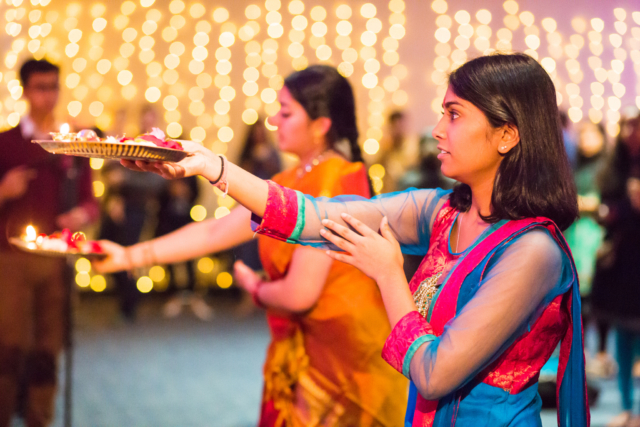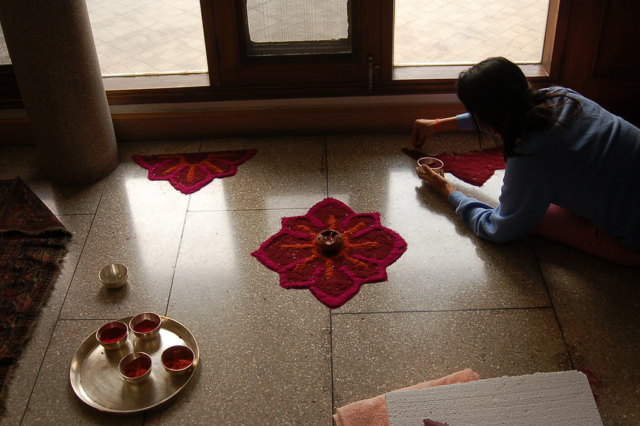
Diwali Celebration by Natalie Carroll on flikr
Days before the celebration, family women work hard to prepare traditional dishes for family and friends. It is tradition to have an exchange of typical Diwali sweets with neighbors, friends and family.
For the majority of Hindus, Diwali is the time of the year where Rama and Sita return after more than decade of exile. To welcome them, believers would light lamps made of oil to illuminate the darkened path. For others, Diwali is commonly celebrated to honor Lakshmi, the goddess of prosperity and richness. The holiday lasts five days, and each day has different rites and milestones to complete. Here is a short run through of what may occur on each day:
- Dhanteras: Day one is known to be the festival of wealthy, therefore, it is good omen to clean the house, shop for kitchen utensils, and for gold. Avoid iron.
- Naraka Chaturdasi: For day two it is common for people to start the day early and conduct rituals with oil, flowers and sandalwood. Then, it is all about decorating their home with clay lamps and using colored powders or sand to design patterns on the floor. These designs are called rangoli.
- Rangoli is traditional Indian folk art which represents art through color. It was the form people from ancient India would use to welcome their guests and bring good-luck to their homes. Photo by Ian Brown
- Lakshmi Puja: Day three is the official start to the festival, families and friends gather together to pray for the Goddess Lakshmi and then enjoy a delicious feast with fireworks and activities. On this day, prayers and rituals are dedicated to Lakshmi
- Padwa, Balipratipada: Day four is considered the day to celebrate love and unity between husband and wife. Friends and family get together to give each other gifts and good wishes.
- Bhai Duj and Bhaiya Dooji: On the last day of Diwali, male siblings tend to visit their married sisters for a special holiday meal. The goal is to eat with family and appreciate each other.

Diwali Rangoli Creation by Ian Brown on Flikr
For Indians, Diwali is a very important spiritual or religious holiday. It also impacts the country’s economy on a grand scale. This holiday is considered to be the largest shopping period in India, due to the honoring of Lakshmi, the goddess of wealth and prosperity. According to Statista, the amount of money spent during Diwali last year in 1017 was of ₹ 25,000 crores, which is over 3 billion dollars. If that isn’t considered good business, I don’t know what is!
It is no surprise that cultures worldwide celebrate different holidays and traditions. However, what we all have in common, no matter our place of birth or origin, is how much we enjoy celebrating our roots and beliefs with families and friends. It is part of our human nature and what makes us such fascinating and unique beings.
Sharon Schweitzer and Sophie Echeverry co-wrote this post. Sharon Schweitzer, J.D., is a cross-cultural trainer, modern manners expert, and the founder of Access to Culture. In addition to her accreditation in intercultural management from the HOFSTEDE Centre and the Intercultural Communication Institute, she serves as a Chinese Ceremonial Dining Etiquette Specialist in the documentary series Confucius was a Foodie, on Nat Geo People. She is the resident etiquette expert on two popular lifestyle shows: ABC Tampa Bay’s Morning Blend and CBS Austin’s We Are Austin. She is regularly quoted by BBC Capital, Investor’s Business Daily, and Fortune. Her Amazon #1 Best Selling book in International Business, Access to Asia: Your Multicultural Business Guide, now in its third printing, was named to Kirkus Reviews’ Best Books of 2015. She’s a winner of the British Airways International Trade Award at the 2016 Greater Austin Business Awards and the 2017 New York City Big Book Award for Multicultural Nonfiction.
Sophie Echeverry is the corporate marketing manager and event coordinator at Access to Culture. Born and raised in Colombia, she’s a 2018 graduate with a B.B.A. in International Business and Marketing from Hult International Business School in San Francisco, CA. Connect with her on LinkedIn.

Leave A Comment